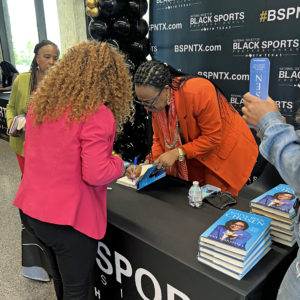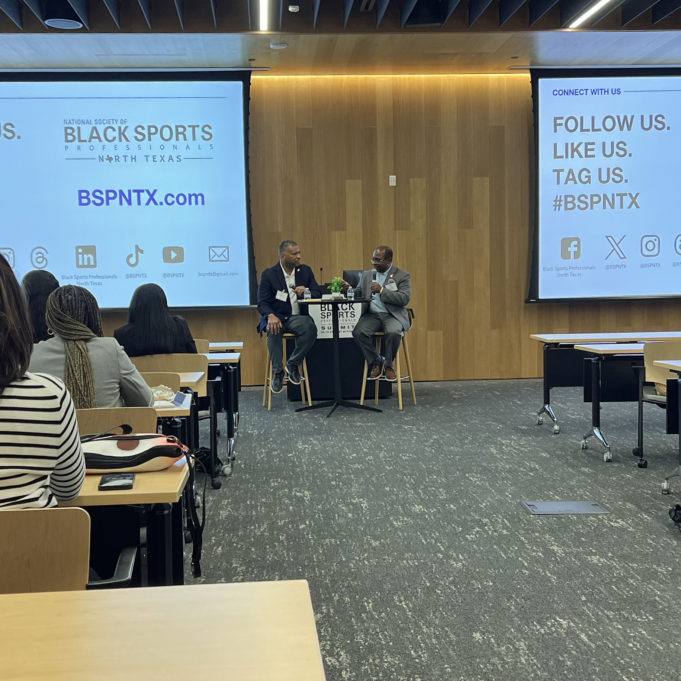“It is a group of 24 leaders that are on this team,” Richard Clark said Saturday, referring to the College Football Playoff full-time staff roster he heads as the LLC’s executive director.
“Whether you’re brand new and you’re at the absolute lowest level of the ladder, or you’re at the top of it, you’re a leader,” he told the crowd of 120 at the 2025 Black Sports Professionals North Texas Summit. “It just matters how you engage and connect with the people around you and how do you try to help move that organization along.”
Clark’s advice to exhibit a grasp of the big picture even if you’re not technically in charge of it will serve him well this week.
“We have a big meeting with all the commissioners (10 conference commissioners and the Notre Dame athletics director) starting on Tuesday,” he said. Even though he holds an executive director title, he’ll have to lead from a subordinate position. To prepare, he’s already studied the big issues they’ll discuss. One important one involves how many teams will constitute the playoff field going forward.
“Is it going to be a 12-team, or it’s going to be a 14-team, or is it going to be a 16-team? Because people want more. They loved it. They want to see more games.”
A solution sounds simple enough – add more games. But Clark discovered early in his tenure that a key factor limits his committee’s options, thanks to a conversation he had with NFL Commissioner Roger Goodell.
“We’re talking about the scarcity of resources, which is time – finding those TV windows,” Clark explained. As he’s looked at limited weekend availability for football telecasts in December and January, plus the need to be mindful of academic calendars, he’s determined which way he may have to try to lead his bosses.
“We’re already bumping up on the NFL schedule. We’re bumping up on college graduation schedules for December graduation, so there’s limits to how big we can get,” he said. “I try to present them options on how they can do this. I can’t even give them a good option for 16 and how we would fit that into the TV schedule . . . I would go to 14 if it was me, if it was my decision.”
Clark learned about decision-making, leadership, and allocation of scarce resources during his 38-year career in the United States Air Force. He insisted moderator Scottie Rodgers call him “Rich,” though addressing him as “General Clark” would certainly have seemed appropriate since he attained the rank of Lieutenant General during his time in the service. The directive is consistent with one of his key core pillars of leadership: humility.
That quality helped him when he came to a realization after leaving the armed forces to join the CFP.
“I used to always think, ‘Well, the military has a corner on the leadership market,” he said. “It was all I knew anyway, but it couldn’t be further from the truth.” Other speakers at the event proved his point.
Clark had Bill Hancock, a man he called a “hero” as his predecessor helming the CFP. That gave the former general a leg up in implementing his core leadership pillars of integrity, humility, and excellence. Cynt Marshall, who spoke during the program’s concluding session, was not blessed with similar circumstances when she took over as Dallas Mavericks CEO. She had to confront a previous culture rife with sexual harassment and workplace toxicity. She showed that a woman of color with a corporate background could also lead a sports entity effectively, thanks in part to having her own ethical framework in place.
 “Our values at the Mavericks spell “CRAFTS,” and it was based on my personal set of values, and it’s character, respect, authenticity, fairness, teamwork and safety,” she told moderator Alexandria Williams. Williams had gotten hired at the team following a job interview with Marshall and expressed her appreciation for the culture change the former AT&T exec and Mavs CEO had implemented at the franchise.
“Our values at the Mavericks spell “CRAFTS,” and it was based on my personal set of values, and it’s character, respect, authenticity, fairness, teamwork and safety,” she told moderator Alexandria Williams. Williams had gotten hired at the team following a job interview with Marshall and expressed her appreciation for the culture change the former AT&T exec and Mavs CEO had implemented at the franchise.
The day’s second panel also touched on the subject of leadership. Jenn Hunter, Chief Impact Officer at the Big 12 Conference, echoed Clark’s statements about humility and thinking about what’s best for the big picture of one’s organization. She related it specifically to junior employees eyeing rapid promotions.
“A lot of young folks are trying to ascend to titles quicker than they’ve gotten the experience to hold,” she explained. “A lot of people think that they’re ready for that because they’re more worried about them in the position and not the team, but if you play your part, you do become the franchise player. You do get that franchise tag one day, but you have to be humble. You have to be patient, play your part, move the team and the brand forward, and you will get where you want to get.
Derek Eagleton, Senior Vice President of Media and Programming for the Dallas Cowboys, followed up Hunter’s pro football analogy with a caution to remember that leadership, as a Rich Clark dealing with scarcity issues or a Cynt Marshall facing down a destructive culture have experienced, means dealing with more than the perks that come with the “boss” titles. It means taking on accompanying challenges, too.
“If you’re not ready to take the fall, you’re not ready for leadership. I tell my team this regularly, my directors, I’m, like, when things go well, what I’m saying in the meetings, when I’m talking to ownership, is the team killed it. They did a great job. When things go wrong, what I’m saying is that’s on me. I messed that up, and it could have been someone else who was really at fault. But at the end of the day, I’m the leader. I have to be accountable,” said Eagleton.
The large contingent of students at the symposium hope to break into the sports business and, perhaps, eventually ascend into roles like the ones the panelists currently occupy. Saturday, they learned that becoming an effective leader is a project they can already be starting on.
I’ll have more observations from the 2025 Black Sports Professionals North Texas Summit later this week.












